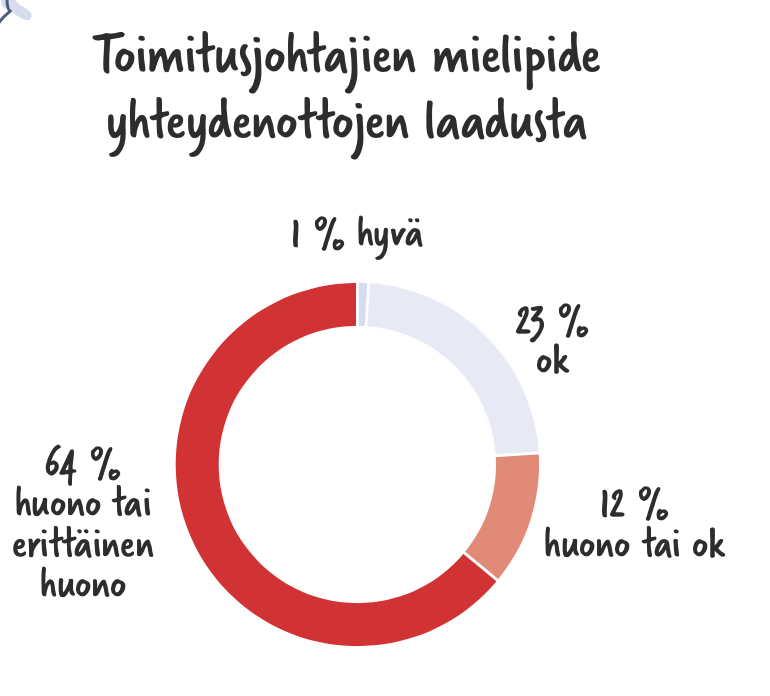
Finnish companies’ top executives would love to meet with salespeople more frequently. However, sadly, the outreach from these sales reps is often so abysmally poor that opening a line of communication proves impossible. This prevailing attitude came to light in a recent study I conducted, in which I interviewed one hundred Finnish CEOs.
Here are a few direct quotes from interviews in which CEOs assess the quality of sales reps’ outreach.
“My goodness, the Americans are brilliant compared to the Finns. They [the Americans] have done their homework and make you feel smart and special, they listen carefully!”
“American salespeople are the best—they’ve really thought through and personalized their message when they reach out. Sometimes you see this in Finland too, but it’s rare.”
“The way salespeople in Finland try to secure meetings with me really reflects how we are a product society, not a customer society.”
“The approach Finnish salespeople take makes no sense; I get contacted about all sorts of trivial matters. For instance, some of the things they’ve tried to sell to me recently include firefighter calendars, air conditioning units, trash bins, and distributorships for light cranes.” (CEO of a large IT services company)
Although most interviews view the quality of contacts very critically, at the same time, the best salespeople continuously manage to meet with the top executives of customers.
In this text, based on interviews, I will delve into concrete examples of what these top sellers do differently than others. Why exactly are they successful in capturing the attention of the highest level of customer management?

Source: Strateginen Kumppani, page 107
#1 The best sell information to get an appointment
The task of management in organizations is to find new ways to develop the company. This is why they have a higher interest in meeting individuals who bring them new ideas and perspectives. Such individuals include consultants and consultatively operating salespeople.
Similarly, CEOs have no interest in meeting salespeople who can’t converse about current market trends or bring ideas to the table that could enhance their company’s competitive edge. So, don’t just sell a product or service – sell valuable information!
Here are some excerpts from a few interviews.
“I always need some tangible information or a learning opportunity on offer before I agree to a meeting.”
“I want the salesperson to commit to bringing insights to the meeting, meaning ideas and new perspectives on our industry and how we operate.”
“I always want to hear what’s happening in the market, what changes are coming, and what the competitors are doing.”
According to a study by the analyst firm Forrester on this topic: “86% of decision-makers agree to listen to sellers if they have relevant insights related to business development.”
An excellent way to capture the attention of a customer’s top management is to use information as a bargaining chip. You can gain time from the leadership by offering them new, intriguing information or fresh insights in return.
#2 The best ones immediately show that they understand the customer’s situation
The best salespeople do their homework so thoroughly that they know in advance the CEO’s most likely priorities and challenges and are able to bring these issues to the forefront right at the beginning of the interaction.
Naturally, no one can keep a precise track of every single industry, so the importance of specialization in sales really shines through. Focusing on specific industries helps salespeople stay up-to-date with what’s happening in the sectors that matter most to their key clients.
The salesperson must have some relevant, fresh information or insights about the customer’s strategy, industry, or even competitors.
A busy executive wants to quickly ensure that the person reaching out understands their business well enough to have a productive conversation – should a meeting be arranged. Therefore, not all information can be held back until the actual meeting.
Here are a few highlights from the interviews:
“If the salesperson is truly clued-up about our industry, it’s easy to invite them over for a discussion.”
“I want to hear something relevant to our industry during the call. For example: ‘You’re in a price competition, aren’t you?’ I want to mentally say ‘yes’ to something the salesperson brings up early in the conversation, otherwise, I won’t schedule a meeting with them.”
“You have to start with some hypothesis and test it through me, like, ‘I know you’re in this business, and you’re facing these x, y, and z challenges. Is that right?’ If the seller suggests that they can share how they’ve solved these problems with others, that already starts sounding interesting.”
Therefore, there’s absolutely no room to skimp on doing proper groundwork. One must prepare for each interaction so thoroughly that during the call itself, you can impress the other party with your knowledge.
#3 The best get in touch in many different ways
Low-performing salespeople plow through every number on their call lists, endlessly dialing until the potential customer either picks up – or perhaps never does.
The issue is that CEOs rarely answer their phones. Here’s a bit of data from a hundred interviews: 49 percent of CEOs said they never answer calls from unknown numbers, and 25 percent sometimes answer—if it’s a “good moment.”
When a phone alone isn’t enough, you need to approach people through multiple channels. Today, a salesperson’s skill set includes the ability to concisely and attractively articulate their point in writing.
Personal channels such as WhatsApp, text messages, or voice messages are seen as a positive way to stand out from mere callers. A well-crafted, personalized message can enhance the chances of getting a response from a CEO on the phone – or sometimes even prompt them to call the salesperson back.
One person I interviewed put it this way: “Leave a voicemail or send a text – when you leave a message, it creates a psychological ‘obligation’ to respond.” Finally, if a salesperson wants to ensure that they secure a meeting with a top-level decision-maker, it’s crucial to ensure that the matter is significant from the company’s strategic perspective and also framed in such a way that it could have a major impact on the company’s success and competitiveness.